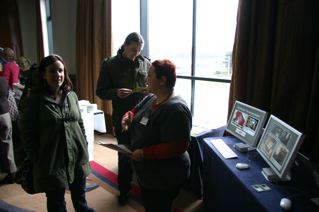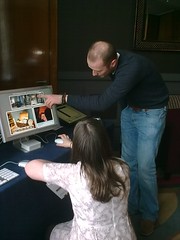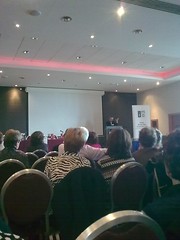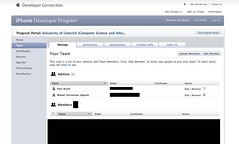**********************CALL FOR PAPERS**********************
Workshop "Bridging “Interaction Clouds”: Exploring collaborative interaction across assemblies of mobile and embedded technology"
To be held at ECSCW 2009, Vienna, Austria 7-8 September.
http://bridgingclouds.blogspot.comECSCW09***************************************************************
Overview
Portable technology, particularly in the shape of mobile phones and personal digital assistants, has become a ubiquitous force in everyday life. Advances in communication technologies have also meant that we are rapidly moving towards the convergence of mobile and stationary systems: this has allowed people to use mobile technology to engage with systems embedded in the environments they inhabit, offering a greater range of interaction possibilities and patterns that we have labeled “Interaction Clouds”. By “Interaction Clouds” we mean the complex patterns of interaction, sharing and exchange that unfold around assemblies of mobile and embedded technologies.
This workshop aims at exploring such issues in greater detail, with a specific focus on the design of a coherent social and collaborative experience for people as the transverse an “assembly” of technologies. The notion of Interaction Clouds also resonates with the emergence of the internet as a resource free of device and location constraints has brought about the concept of “cloud computing”, where technology is emerging that allows people to shift between multiple contexts (mobile/embedded), facilitated by a connection to remote computing resources (clouds). This devolving of traditional interaction paradigms brings with it new challenges to support meaningful user social and collaborative experiences, specifically how such hybrid systems can facilitate salient aspects of user experiences such as collaboration and participation.
Topics of Interest
• Studies of social and collaborative activity around interaction clouds
• Design for the support of collaboration and participation across interaction clouds
• New interaction modalities in interaction clouds that support social interaction
• Theoretical issues of how to define and study interaction clouds (merging mobility-oriented and space-oriented frameworks, new conceptual approaches, development of existing frameworks, etc.)
• Explorations of settings where interaction clouds can be meaningfully deployed: e.g. public spaces (museums, urbans areas), workplaces, domestic spaces, etc.
Dates and Deadlines
Submissions are due: June 20th, 2009
Notification of Authors: 6th July, 2009
Workshop at ECSCW 2009: September 7th - 8th, 2009
Submissions
Interested participants are invited to submit position papers in PDF format with a word limit of 5000 words. Papers should be formatted according to the ECSCW template see
the instructions for authors.
The .pdf files should be sent to: marc.mcloughlin@ul.ie
Workshop outline
The Workshop will run over 1 day. The Workshop call requests the submission of short position papers. However, during the workshop, we will foster debate moving away from traditional presentations, and by facilitating discussions on shared artifacts. We will invite the participants to contribute to the workshop with either posters, or demos/prototypes, or video data documenting an experience, and these materials will be the main subject of the discussion. In the afternoon session, we will lead more focused small-group discussions and brainstorming, and practical design exercises.
Publication & dissemination
Accepted papers will be included in the Workshop Webpage. During the workshop participants will be asked to prepare posters for display during the conference. During the workshop, opportunties for future publications (such as a journal special issue) will be discussed.
Organizers
Marc McLoughlin, Interaction Design Centre, University of Limerick, Ireland
Luigina Ciolfi, Interaction Design Centre, University of Limerick, Ireland
Mike Fraser, University of Bristol, UK
Eva Hornecker, University of Strathclyde, UK
John Bowers, Interaction Research Studio, Goldsmiths, University of London, UK
Contact Details
Workshop Webpage: www.bridgingclouds.blogspot.com
Please Contact the workshop chairs at: marc.mcloughlin@ul.ie










